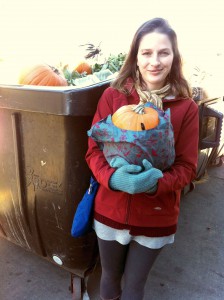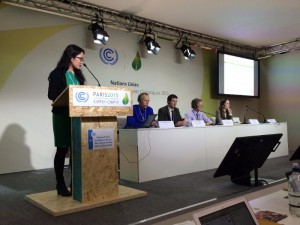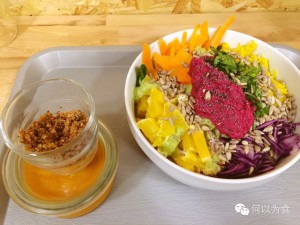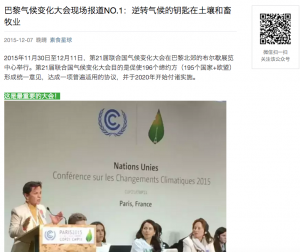
Animal Farming and Planet Health at COP21
This blog is part of Wanqing Zhou’s longer report on her work at COP21 in Paris, France in December 2015. To read that longer blog entry, click here.
Brighter Green’s side events took place in the second week, when the number of other side events related to meat production and consumption also increased. These stimulated the discussion on animal farming and its impacts on climate change, environmental pollution, food security, and public health. Experience of dietary change was also a hot topic, with philosophical reflection on the widespread overconsumption of meat and in general, on the differences between typical western and eastern views of nature and health, and on whether meat, eggs, and dairy should be categorized as foods at all.
It is not clear how many people in the group are already following a vegetarian or vegan diet, but among those who actively participated in the discussion, at least half were not. However, based on the discussion, consensus was that a plant-based diet is better for the health of people and the environment.
This perspective is also reflected in the comments under “COP21 Side Events Call for Less Meat Consumption and Less Emissions”, an article by Ling Wang and published on Caixin.com. Among a dozen comments, more than half supported the idea of eating less meat. Examples include:
“This is not a joke. It is actually the same as calling for green transport and energy saving,”
“We indeed need to reduce meat intake,”
“A plant-based diet is better for the environment,” and
“Zero meat consumption is also doable.”
Hongqiao Liu from the Earth Journalism Network also reported on the Brighter Green side event, as well as the neglected issue of meat in the climate negotiations.
The role of regenerative grazing was brought up by some WeChat group participants who followed this method in their research. It was agreed that although regenerative grazing, when done correctly, can help restore ecosystems and sink organic carbon into the soil, more research is needed to study the effectiveness of this practice in different areas, and better farm-level measurement is needed to show the net climate impact on commercial stocking rates, before it is used to encourage the consumption of “carbon-sink meats”.
This is especially true in developed countries like the U.S., where per capita meat consumption has already exceeded threefold a level that poses serious threats to human health. At the same time, as shown in the WeChat group discussion, an increasing number of people in China, where the per capita meat consumption is 50% lower than that in the U.S., are waking up to the fact that the human body doesn’t require animal-based foods to be healthy.
On December 7, excerpts from the first week of group discussion were edited into a WeChat article and posted on VegPlanet, the largest vegan online platform in China, and reached nearly 1800 readers. It is encouraging to see the general public becoming increasingly concerned about the problems of livestock production and overconsumption, and sharing their opinions openly using information technologies to benefit more people. One year after we launched the WeChat Monthly Global Dialogue, our readership and volunteer group continues to grow, and we are seeing richer involvement in the discussion. Looking forward, activities like this are leading towards not only raised awareness, but also real actions for a more sustainable food system.
Photo Credit: Wanqing Zhou
COP21 Live Dialogue: Engaging the General Public on WeChat
Imagine waking up every morning to fresh event reports on climate change, livestock, and dietary shifts, and contributing to the hot discussion with researchers, practitioners, and activists after dinner. During the 21st Convention of Parties (COP21) in Paris, Brighter Green experimented on such an engaging project using WeChat, a smart phone application phenomenon in China.
![]() Almost everyone in China with a smart phone uses WeChat. It has the function of both WhatsApp and Facebook, allowing group discussions and sharing of photos, articles, and videos with followers. Since December 2014, Brighter Green has organized monthly discussions featuring experts on animal rights, nutrition, and diet, as well as the environment; the series is called Global Dialogue Online.
Almost everyone in China with a smart phone uses WeChat. It has the function of both WhatsApp and Facebook, allowing group discussions and sharing of photos, articles, and videos with followers. Since December 2014, Brighter Green has organized monthly discussions featuring experts on animal rights, nutrition, and diet, as well as the environment; the series is called Global Dialogue Online.
In the WeChat group established for a certain topic (e.g. farm sanctuaries, veganism, livestock and climate change, animal protection, etc.), the guest speaker can communicate with an audience in English or Chinese, with nearly simultaneous translation by volunteers. Brighter Green collaborates with What’s For Dinner? director Jian Yi and intern Miao Jie, in addition to a growing group of global volunteers, to coordinate these monthly live chats. Global Dialogue Online is an interactive aspect of the larger What’s For Dinner? (WFD)-themed WeChat group, which posts engaging, rich, unique content articles almost daily. Read More
Montreal Vegan Festival – An Exchange on the Food Movement
It was 40 degrees Fahrenheit and windy, but veganism created a hot spot at the heart of Montreal. Organizers of the Montreal Vegan Festival estimated that on November 7th, over 10,000 people were attracted to the rows of vegan product-sampling booths, mouth-watering culinary demonstrations, and eye-opening stories that transformed lives around the world.
As part of the forum, Brighter Green’s documentary What’s For Dinner? was screened to 250 people, followed by an introduction to the ongoing vegan movement in China.
To most people in Montreal, China is both familiar and unfamiliar. Media coverage about China’s growing meat consumption can easily worry our vegan friends in Canada, but the reality is still far beyond reach. Through the lens of film director Jian Yi, the audience was directly exposed to the social and environmental complexity on the other end of the globe, as well as the discussions and changes that are taking place at the moment.
Through the documentary and dialogue, the audience found answers to several questions about which they were concerned:
Are Chinese people very carnivorous? No, the traditional Chinese diet is mostly plant-based and the culture does not encourage people to eat a lot of meat.
Are Chinese people aware of the problem of animal-based foods? Yes, and there are hard-working activists in China, diligently spreading the latest news, research, videos, and opinions that promote a healthier and happier life.
Is the government trying to stop you in any way? No. We see our goals in line with several priorities of the government – public health, environment, and food security – and there were local officials coming to our screening event in China!
Do people in China care about animal suffering? Of course yes. We are all human beings. When we are exposed to the ugly facts, we have the same feeling of sadness, and the same desire for putting the cruelty and violence to an end.
Yes, we are all humans, and yet, every encounter is always full of surprises. Exclusively volunteers, without even one full-time paid coordinator, organized this big festival. Local vegan magazine, Versus, was very impressive with its pleasing artistic designs and professional print quality, presenting in-depth analytical articles, moving stories, fashion sketches, and delicate recipes.
paid coordinator, organized this big festival. Local vegan magazine, Versus, was very impressive with its pleasing artistic designs and professional print quality, presenting in-depth analytical articles, moving stories, fashion sketches, and delicate recipes.
In Montreal, a food movement is in full gear. This can be seen in the long lines outside the vegan festival site, in the airplane stickers on farmers’ market price tags indicating imported vegetables, in numerous vegan restaurants serving delicious and creative foods, and in beautiful young women who reach into dumpsters without hesitation to rescue slightly scratched pumpkins.
All of these are the hope of a food system full of love and consciousness. When we break down stereotypes and exchange hope, we begin to feel the commonality in each other, no matter how great the distance is between us.
Photo Credit: Montreal Vegan Festival & Wanqing Zhou
Braai and Brotherhood in South Africa (Part IV)
Caroline Wimberly traveled to Durban, South Africa in late August 2015 to attend three conferences on behalf of Brighter Green. Afterwards, she traveled extensively around the country. This blog is the fourth in a four-part series on her experiences and observations during the trip.
I was told by multiple different Afrikaners (a large ethnic group in South Africa of mostly Dutch descent that developed their own language called Afrikaans in the 18th century) that animal products played a large role in their diets, and I got the impression it was more important as a cultural tradition than anything else. It was the Afrikaner community that started the South African tradition of braai, which is similar to a barbecue, but more deeply-rooted and community-oriented, with a specific braai master in charge.
Braais are not only gatherings where grilled food is served (mostly meat), they are also important points of connection. To emphasize their value across communities, a campaign to formalize a holiday called National Braai Day began. It was endorsed by the country’s National Heritage Council in 2008 and coincides with Heritage Day (September 24). Furthermore, it boasts a world-famous patron, Nobel Peace laureate Archbishop Desmond Tutu, who has called it, “something that can unite us.”
Biltong and Drought in KwaZulu-Natal (Part III)
Caroline Wimberly traveled to Durban, South Africa in late August 2015 to attend three conferences on behalf of Brighter Green. Afterwards, she traveled extensively around the country. This blog is the third in a four-part series on her experiences and observations during the trip.
South Africa is a beautiful country. I was astounded at its topographic diversity, prevalence of various wild animals, and multiple languages (it has 11 official ones, with tribal languages Zulu and Xhosa being the most widely spoken).
Another noticeable feature of South African culture is the prevalence of meat. From Zulus to Afrikaaners to tourists, meat plays a big role in the diets of many South African communities. Even though the country’s per capita meat consumption is about 65 kilograms (143 pounds)—just slightly over half of U.S. consumption levels— meat is pretty much everywhere.
 Brighter Green
Brighter Green







